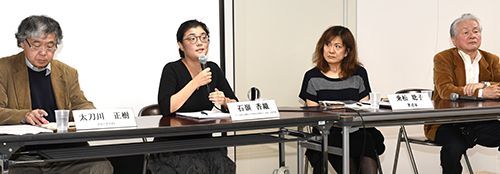East Asia symposium looks at Korean Peninsula and Okinawa, discusses building peace by understanding history

Panelists at “The East Asia Situation and Okinawa” symposium on January 19 at the second-floor gallery of the Ryukyu Shimpo building in Izumizaki, Naha
January 20, 2019 Ryukyu Shimpo
On January 19, a symposium titled “The East Asia Situation and Okinawa”, organized by the East Asia Community Institute’s Ryukyu/Okinawa Center, was held at the Ryukyu Shimpo gallery in Izumizaki, Naha. Peace Philosophy Center director Satoko Norimatsu and others discussed such topics as the relationship between Okinawa and reducing tension on the Korean Peninsula where North and South have long been at odds.
Norimatsu talked about efforts to overcome white male supremacy in Canada, where she lives, and a human rights museum there.
“Hiding the truth and denying history are the biggest obstacles to reconciliation,” said Norimatsu.
“This can be surmounted by overcoming borders and nationalism and turning our eyes to the stories of individuals.”
She discussed the Nanking massacre and the Battle of Okinawa and said, “Okinawa is in solidarity with other victim nations in terms of having been the victim of Imperial Japan. Learning about history will help lead to the construction of peace in East Asia.”
Kaori Ishimine, co-director of the “Association for Creating a Peaceful Future for the Children of Tidanufa Island,” an organization that opposes deployment of the Japan Self-Defense Forces (SDF) on Miyako Island, discussed the current SDF deployment situation. “
We need to think of the issue of SDF deployment and reinforcement as a problem for Okinawa as a whole.
Just stopping the Henoko [new base construction] won’t stop the militarization of Okinawa as a whole,” she said. She argued that the SDF’s contributions to disaster reconstruction have led to a taboo against criticism of the buildup of SDF troops and said, “We, who know the truth [of the increased militarization], must convey to others what is really happening.”
Masaki Tachikawa, a journalist who has long covered the Korean Peninsula, criticized the Abe administration, saying, “The Abe administration would not be happy about reunification of North and South Korea. Meanwhile, there has never been a [Japanese] administration that both North Korea and South Korea despised so fiercely.”
He gave an analysis of Japan’s situation, saying, “In Germany, the parliament passed a resolution to officially apologize for the actions of the Nazis. In Japan, a Diet resolution apologizing for pre-war and wartime acts of aggression would entail a repudiation of the Emperor, and so conservative forces find themselves unable to take such a step.”
(English translation by T&CT and Sandi Aritza)
Previous Article:Japanese government looks to alter Henoko construction plan after acknowledging soft foundation, wants to reclaim land in new zone
Next Article:Post-war archives including 16,000 films digitized, available online
[Similar Articles]
- Editorial: PAC-3 deployments raise tensions when diplomatic efforts should be prioritized
- Memorial ceremony held for Koreans mobilized during war, exhumation in May
- East Asian Critical Journals Conference aims to overcome nationalism
- European couple visits Okinawa during round-the-world trip on tandem bicycle
- East Asia Publishers Conference in Okinawa addresses reviving an East Asian reading community
 Webcam(Kokusai Street)
Webcam(Kokusai Street)


